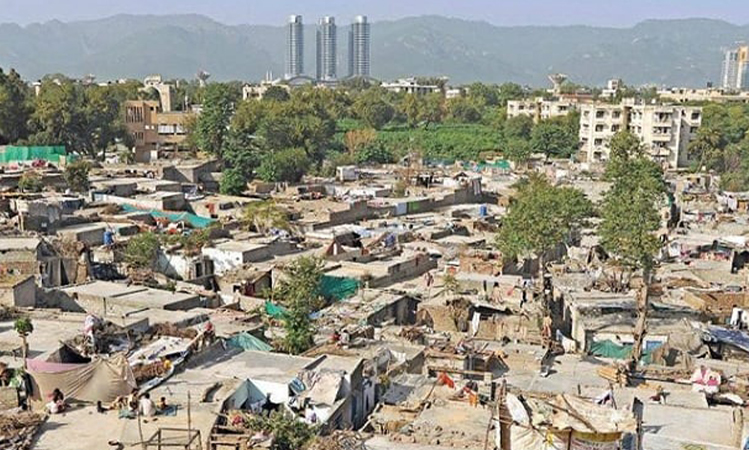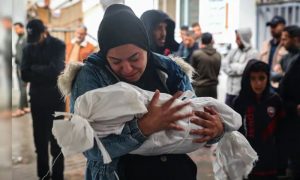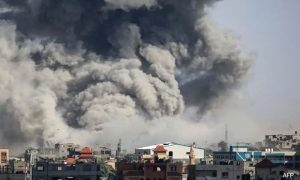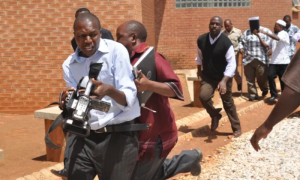The boundary walls around slums located on one side of posh sectors of Islamabad depict class discrimination, with inhabitants of these shantytowns having to put up with bare minimum basic amenities.
Already at risk from rains, flooding and open sewers, slum-dwellers in the capital’s G-8/2 and F-7 sectors have a story full of miseries. These Katchi Abadis have a majority of the Christian population with poor socioeconomic backgrounds. It was discovered that in a single small house, two to three families live together, including parents and their married sons and some with also divorced daughters. In these slums, most men are unemployed, and women work as housemaids in nearby sectors to make ends meet.
According to the Capital Development Authority (CDA), there are 11 Katchi Abadis in Islamabad, where predominantly Christians reside.
According to the 2017 census, Christianity is the third largest religion making up about 1.27 per cent of Pakistan’s population.
Fifty-year-old Rani, who returned had home after work as a maid while talking to World Echo said: “Any government never owns us in Pakistan. The previous government of Pakistan Tehreek-e-Insaaf promised to give us flats and we submitted forms as well but our dream to have a house shattered, as always, after the removal of the government.”
She seemed disenchanted as she refused to talk further, saying: “These stories in media cannot help us. We are born with these situations and now I believe we will die like this.” She walked away after a curt conversation.
Another young girl Urooj, who was cleaning stairs with a mop, said that life ended for her when her husband left her just after one year of marriage when she was a nine-month pregnant. Despite being married, she was compelled to share the only room her parents had, as her in-laws refused to keep her with them because Arsalan, her husband, was jobless. Soon after marriage, their differences started and ended in separation.
Remembering the bitter days of her life, Uroog told World Echo: “We Christians live a life full of miseries in slums.” She further said in support of her words: “We don’t have houses and jobs even in Islamabad. Our Abadis lack basic facilities such as water, electricity, health facilities, schools and homes. She said that she and her four young children live with her mother in a one-room portion on the third floor of a three-marla house owned by their grandmother.
“You will be thinking, what is the point in telling you all this? she said before explaining: “There is a point to share; if we had our own home with a peaceful environment, my life could have been different as I got married early to get escape from this environment. My husband showed me a beautiful life together in a separate home, where no one would curse me for everything.”
Urooj lost her daughter shortly after delivery due to stress and anxiety. She named her daughter Angel and kept her images with her on the phone screen to feel her presence and warmth.
Aasim Sajjad Akhtar, a professor at the Quaid-e-Azam University and Deputy Secretary General of Awami Workers Party, said that the CDA accepts only 11 slums in Islamabad. According to him, there are up to 80 big and small slums on the outskirt of the capital.
He said that in Islamabad slums, most of the population is Christian. In other slums outside the capital, there are migrant workers from Khyber-Pakhtunkhwa, Azad Jammu and Kashmir and Punjab.
He said: “These people are facing a number of problems but on top of this is the shortage of houses to live in. When they construct a new room for their newly-wed sons, here comes the police to make money by harassing them, otherwise, they demolish it.”
“The CDA itself gave place to Christians in H-9 after the famous Rimsha Masih blasphemy case. Now after 10 years, when poor people invested in constructing homes, civic agency officials want them to evacuate the slum for the construction of the 10th avenue,” he noted.
He said, “our society has locked them up behind a boundary wall, where they have limited resources and lack of jobs, homes, health, education and other facilities. Then, we blame them for the rising crimes in society. We don’t consider them part of our society, but at the same time we call them to clean our shits,” he said with a sarcastic smile.
CDA Public Relations Officer Syed Asif Raza Shah said, “These dwellers are land grabbers and settled here illegally. The CDA is working on a project to provide them with a alternate land and flats in Ali Pur Farash. These settlements are a clear violation of the master plan of Islamabad and therefore these will be removed from here sooner or later.”
Supporting his argument, he said: “If I along with 50 others enter a government office and start living there, claiming I have no other place to live, seeking all basic facilities, it will be considered illegal and, I will be thrown out of that place.”
He said that this issue has nothing to do with any religion. Rather, this is a matter of legality and illegality.























